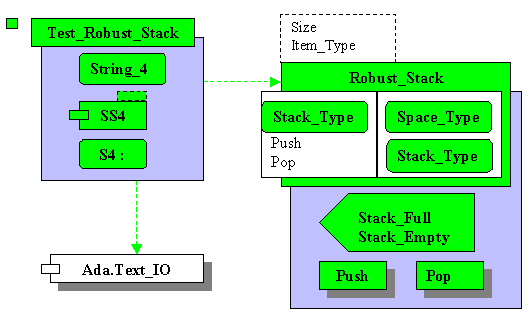3.9 The raise
Statement
[ Table of Contents ] [ Prev ] [ Chapter Overview ] [ Next ] [ Glossary/Index ]
The previous section suggests that for a proper understanding of exceptions, one has to learn how to declare, raise and handle them. This
section contains an example package that declares two user-defined exceptions, includes raise statements in the normal executable
parts of two nested procedures that raise the exceptions, and also includes appropriate exception handlers in those same
procedures. A raise statement is a simple
statement.
Robust Generic Stack Example
In this example we improve upon the generic stack package of the previous chapter. We
make the generic stack more robust by declaring, raising and handling exceptions called
Stack_Full and Stack_Empty. Thus, if the client tries to Push onto a full stack or Pop
from an empty one, the program takes an alternate path and displays an appropriate
message, rather than allowing the program to crash (because Stack.Index would go out
of range).
| The right side of this diagram depicts a generic ADT package called Robust_Stack, whose body
contains the declaration of two exceptions called Stack_Full and Stack_Empty. The test
procedure on the left declares a subtype of String, a generic instance of Robust_Stack called
SS4, and a stack object called S4. |

|
Note the five-sided graphic symbol
used to represent the declaration of one or more exceptions.
Source Code Listing
------------------------- Robust_Stack ---------------------------
-- This generic package provides a template that can be the basis
-- for stacks with different sizes and which store items of
-- different types. It is also robust, in that it handles
-- exceptions raised when the client tries to Push onto a full
-- stack or Pop from an empty one.
------------------------------------------------------------------
generic
Size : Positive;
type Item_Type is private;
package Robust_Stack is
type Stack_Type is private;
procedure Push(Stack : in out Stack_Type;
Item : in Item_Type);
procedure Pop (Stack : in out Stack_Type;
Item : out Item_Type);
private
type Space_Type is array (1..Size) of Item_Type;
type Stack_Type is record
Index : Integer range 0..Size := 0;
Space : Space_Type;
end record;
end Robust_Stack;
------------------------------------------------------------------
with Ada.Text_IO;
use Ada.Text_IO;
package body Robust_Stack is
Stack_Full, Stack_Empty : exception; -- declare exceptions
------------------------------------------
procedure Push(Stack : in out Stack_Type;
Item : in Item_Type) is
begin
if Stack.Index = Size then
raise Stack_Full; -- raise exception
end if;
Stack.Index := Stack.Index + 1;
Stack.Space(Stack.Index) := Item;
exception
when Stack_Full => -- handle exception
Put_Line("Stack is full. Can't Push.");
end Push;
-------------------------------------------
procedure Pop (Stack : in out Stack_Type;
Item : out Item_Type) is
begin
if Stack.Index = 0 then
raise Stack_Empty; -- raise exception
end if;
Item := Stack.Space(Stack.Index);
Stack.Index := Stack.Index - 1;
exception
when Stack_Empty => -- handle exception
Put_Line("Stack is empty. Can't Pop.");
end Pop;
-------------------------------------------
end Robust_Stack;
------------------------------------------------------------------
----------------------- Test_Robust_Stack ------------------------
-- This test procedure tries one too many Pushes, which raises
-- the Stack_Full exception, then tries one too many Pops which
-- raises the Stack_Empty exception.
------------------------------------------------------------------
with Ada.Text_IO;
use Ada.Text_IO;
with Robust_Stack;
procedure Test_Robust_Stack is
subtype String_4 is String(1..4);
Str4 : String_4;
package SS4 is new Robust_Stack
(Size => 4, Item_Type => String_4);
S4 : SS4.Stack_Type;
begin
Put_Line("Testing Robust stack");
New_Line;
Put_Line("Pushing Adam"); SS4.Push(S4,"Adam");
Put_Line("Pushing Bill"); SS4.Push(S4,"Bill");
Put_Line("Pushing Carl"); SS4.Push(S4,"Carl");
Put_Line("Pushing Dave"); SS4.Push(S4,"Dave");
Put_Line("Pushing Eric"); SS4.Push(S4,"Eric");
New_Line;
for I in 1..5 loop
SS4.Pop(S4, Str4);
Put_Line(Str4);
end loop;
end Test_Robust_Stack;
------------------------------------------------------------------
|
The above program produces the following output:
Testing robust stack
Pushing Adam
Pushing Bill
Pushing Carl
Pushing Dave
Pushing Eric
Stack is full. Can't Push.
Dave
Carl
Bill
Adam
Stack is empty. Can't Pop.
Adam
|
Note that we did not use blocks to enclose the exception handlers in this case, because
we are happy to have control passed back to the test procedure following the occurrence of
an exception.
Related Topics
[ Back to top of page ] [ Prev ] [ Next ]
